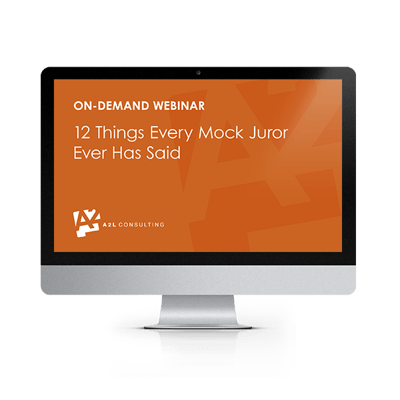We believe that some form of mock trial should be conducted months before trial in any civil case with more than $2 million at stake. Thus, at A2L Consulting, our question is simply to what degree should the mock trial simulate reality?
The value of conducting a mock trial dramatically outweighs the time and expense of conducting a mock trial. We have seen the benefits time and time again.
EARLY PREPARATION OF ARGUMENTS
Forcing trial counsel, and everyone around them, to prepare early - sometimes while discovery is still open - leads to better overall case preparation and less last-minute scrambling and short-cutting. As the ABA recently noted about running a mock trial, "the savvy trial lawyer wants to know every way she can lose her case."
CONFLICT RESOLUTION
Getting a sense of the value of the case early can lead to settlement. We've seen counsel share jury consulting reports to demonstrate the reasonableness of a settlement figure.
TRIAL GRAPHICS PREPARATION
Early preparation of litigation graphics leads to more effective litigation graphics later. As we frequently tell our clients, there is broad scientific consensus on the belief that about two-thirds of the population prefers to learn visually. Accordingly, the visual presentation must be given considerable weight in a mock trial.
BETTER UNDERSTAND THE AUDIENCE
Whether a jury or bench trial in the city or the country, there is tremendous value in understanding the audience a litigator will present to. After all, they can't ask questions. So, it is helpful to understand in advance what they are likely to understand and easily reference without a lot of explanation. This varies from venue to venue (i.e. mining safety, mutual funds or what is means to own a small business).
BETTER UNDERSTAND THE EFFECTIVINESS OF THE WITNESSES
Often a witness cannot be judged until they are exposed to the stress of the mock trial. It is always best to learn the strengths and weaknesses of a witness early, not when it is too late to make a difference in their preparation or presentation style.
SMALL MOCK TRIAL
Attorneys from the same firm, often 1st and 2nd chair of the trial team, make one hour presentations about each side of the case to a collection of other attorneys and admin staff from the firm acting as mock jurors.
Pros: Testing is some form is essential, and better an imperfect test than none at all. Some commonsense reactions to the case and evidence can be gleaned.
Cons: Without testing graphics - two-thirds of jurors prefer to learn visually - one major variable is being left out of the test. See our 3-year study on litigator-juror communications. Further, the law firm staff is not usually representative of the audience.
MEDIUM MOCK TRIAL
Attorneys from the same firm present both sides of the case and prepare independently of one another. Both sides are given the opportunity to develop a trial presentation, usually in the form of a "clopening" presented in PowerPoint. Judges or jurors are recruited with no knowledge of the case and asked for their reactions.
Pros: Much can be learned from this mock trial approach. Most of the benefits listed above will be inured.
Cons: Choosing the mock judges and/or mock jurors from a venue the case will be held in is ideal and a factor that if not present can be hard to control for (i.e. it's hard to simulate Mississippi in Manhattan). However, this can increase cost by adding travel expenses and a leased mock trial facility.
LARGE MOCK TRIAL
Attorneys from different but equally prepared law firms present each side of the case in a long form presentation of 4-8 hrs for each side over multiple days. Witnesses are used (even if in video depo form only). Graphics are extensively used. The case is organized into an opening, case-in-chief and closing. Mock jurors and mock judges for the trial are pulled from the case venue. Multiple groups of judges or jurors are asked to deliberate in private and their results are compared. Trained social scientists prepare survey questions that will elicit a helpful and statistically accurate assessment of the mock trial.
Pros: All of the benefits of a mock trial are fully realized. An accurate simulation of trial is achieved. For perfection, the entire process should be repeated.
Cons: Large mock trials should be conducted only when there is a bet the company matter, personal or financial ruin is possible or anytime there is at least $10 million reasonably at stake.
Whether you are in-house counsel, outside counsel, or litigation support, this 60-minute webinar will prove valuable and reveal secrets learned by one of the world's top jury consultants after watching 400 mock juries deliberate.
Watch Now

Persuadius (formerly A2L Consulting) has extensive experience in complex litigation. For over twenty-five years, we have worked with all top law firms on more than 10,000 matters with at least $2 trillion cumulatively at stake. Persuadius (as A2L) is regularly voted best jury consultants, best trial consultants, and best litigation graphics consultants.
© Persuadius 1995-2026, All Rights Reserved.
Nationwide Contact: 1-800-847-9330